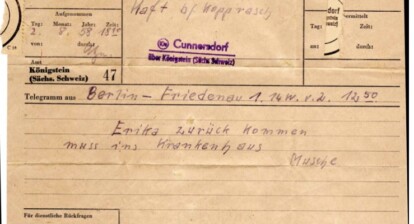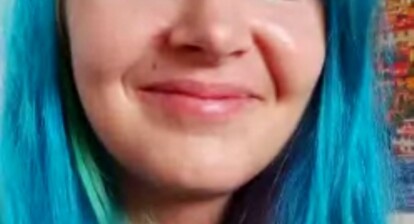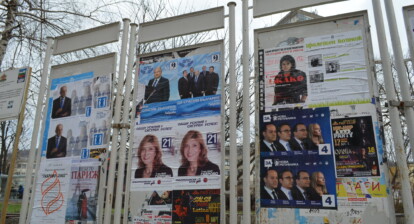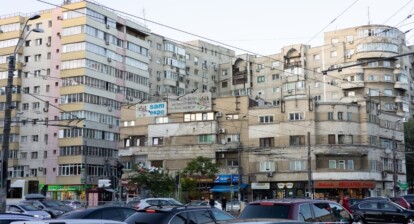On June 4th, 2014, the Presidents of Germany, Poland, the Slovak Republic, the Czech Republic and Hungary commemorated the start of the Peaceful Revolutions in Eastern Europe twenty-five years ago. Twenty-five university students born in the year 1989 were invited to attend the event in Warsaw. Sarah Grandke, who won several awards in the German History Competition and participated in award winners’ academies, had the opportunity to accompany German Federal President Joachim Gauck on his visit to Poland as she was recommended by the Körber-Stiftung. Read more about Sarah’s experiences and impressions in Warsaw.
25 Years of Freedom: Poland’s Historic Elections and the Legacy of Solidarity
„Nie ma wolności bez solidarności – There is no freedom without solidarity”. That was Bronisław Komorowski’s slogan at the 25th anniversary of the first partially free elections in Poland. Twenty-five years ago, on June 4 1989, Poles elected members of the lower and upper houses of the Polish parliament, the Sejm and the Senate. The elections were not fully democratic; however it was the beginning of breakdown of communism in East Central Europe. Not only could Poland turn to democracy, it marked the starting point for other opposition groups in socialistic neighboring states such as Hungary, Czechoslovakia and East Germany. Poland encouraged other people to fight for their freedom.
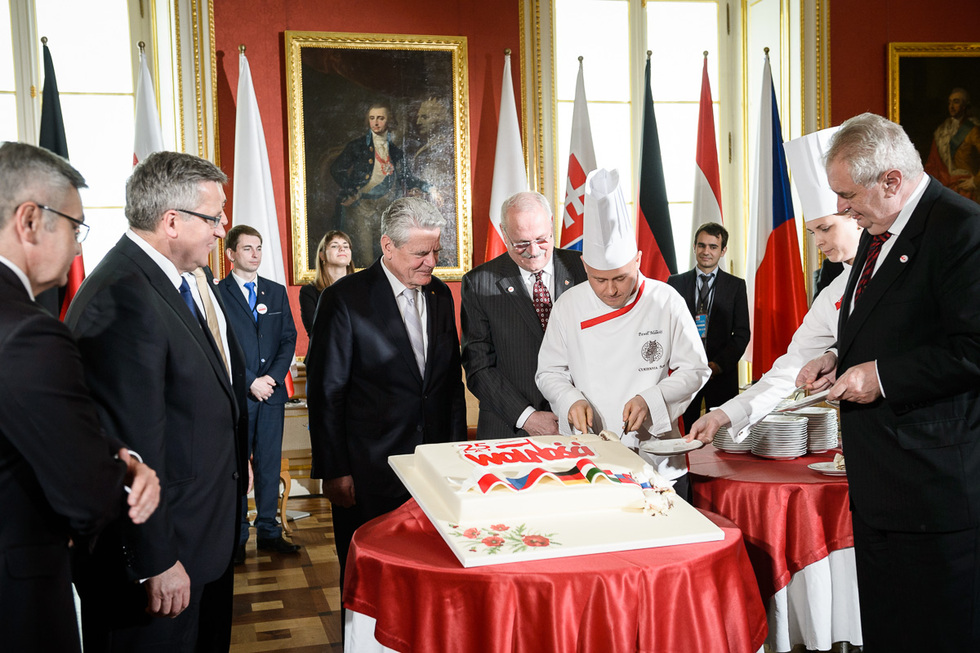
In the Royal Palace in Warsaw, Photo: Bundespraesidialamt, Sandra Steins
It is not surprising that Poland wanted to celebrate the regained freedom 25 years later. The state ceremony was organised a long time ahead, a long list of state guests emphasised the wish of showing the importance of the anniversary. Besides Presidents of other post-socialistic countries such as Czech Republic, Slovakia, Germany, Hungary and others, the new elected Ukrainian President Poroshenko and US-President Obama as well as François Hollande, President of France, attended the ceremony and honored the courageous Polish will of freedom and the effort and achievements the country made during the last 25 years. The anniversary was supposed to show: The West is here and if a nation fights, they will get to their freedom – the connection to Ukraine and the current crises was obvious.
Solidarity Beyond Borders
And that was why the President Komorowski widened his slogan during the anniversary day: “Nie ma wolności bez solidarności z Ukrainią – There is no freedom without solidarity with Ukraine” The day started with a panel discussion attended by Polish President Bronisław Komorowksi, Ivan Gašparovič (at this time still President of Slovakia), Miloš Zeman (President of Czech Republic), János Áder (President of Hungary) and German President Joachim Gauck well as the “Generation Freedom” symbolized by 25 students born in 1989.
The 25 young Europeans were invited to emphasise the significance of the results – a new generation – archived by the Peaceful Revolutions. The Presidents told about their understanding of freedom and how they experienced 1989. The German, Slovak, Czech and Hungarian President agreed that Poland gave courage and hope to their own countries. “For my generation the European language of freedom is Polish“, declared German President Joachim Gauck. The main concern of all five Presidents is that the younger generations tend to take today’s freedom for granted.
Reflections on Freedom
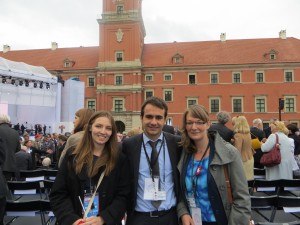
As the youth does not know what lack of freedom means, it is hard for them to value freedom. Therefore the presidents stressed the importance of the attendance of younger people at the anniversary. Memory need to be handed over to new generations. Nevertheless, the main topic – commemoration of peaceful revolutions in 1989 – faded into the background.
Discussed were the Ukraine-crises and the reserved German policy towards Russia as well as concerns regarding internet and freedom. Furthermore the low turnout at the EU-election was discussed. The official ceremony was held on Warsaw’s Castle Square. Scouts distributed Polish flags and badges; songs like “We are the world” were played. Nevertheless the square was a high-security wing: helicopters, special units everywhere and a huge glass box around Obama’s seat and lectern. After a welcome by Komorowski, in which he related to the Polish will of freedom and the Polish tradition of fighting for sovereignty and peace, he spoke about dark and hard times of freedom too, which Poland had been experienced during the 1990s. Still deep and painful reforms were necessary.
Obama’s Address at Poland’s 1989 Anniversary
Thanks to the Poles as well as all other countries especially in Western Europe and North America, Poland transformed itself into a democracy and economically successful country. Komorowski made clear that the anniversary is not just a Polish celebration but a European one, too.
Nevertheless, the highlight was Barack Obama. The US-President spoke with demonstrative composure: He spoke about his closeness to Poland and the Polish people as he always loved the Polish festivals in his hometown Chicago; Chicago is often called ‘the largest Polish city outside of Poland’ with over one million Poles. He described Poland as one of the closest US–friends because of the common ideals and military co-operation. He thanked Poland for active collective military actions within the NATO and described the Polish achievements as “cud nad Wisłą”, which means Miracle at the Vistula.
But with this he not only honored the Polish transformation; it was also a sideswipe at Russia as the so-called “cud nad Wisłą” marked the decisive Polish victory over the Red Army in 1920 in the Polish-Soviet War. The interpretation still triggers off emotional controversies between Russia and Poland. Obama stressed that Poland and other East Central Europe and Baltic States are no NATO-states of second category. He emphasized the importance of the countries, which was definitely important to hear for many people as especially the Ukraine-crises awoke historical fears.I do understand that Poland is seeking for deeper relations with the USA and is striving for support from Western countries. Nevertheless, to me Obamas speech was more sabre-rattling than a celebration of 25 years of freedom in Poland and East Central Europe.
A Debate on Diplomacy and Symbolism
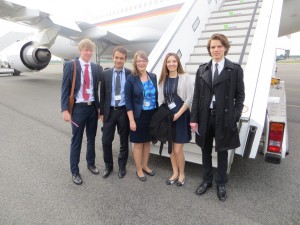
I do understand that the Polish, the people in Estonia, Latvia and Lithuania etc. are frightened and wanted to hear a speech like this, but still I must admit that I think it was not the right speech for that day. The main fixed point on that day and especially in Obamas speech was the current situation in Ukraine and theundoubtedly frightening Russian actions towards a neighboring state. Sure, Obama said, what many Poles wanted to here, but just because of that it doesn’t mean that it was helpful to solve the Ukraine-crises. In my opinion it added fresh fuel to a quarrel and a lot of “feed” for Russian propaganda.
The commemorative ceremony was ended by five military planes flying over Warsaw’s Castle Square. It definitely would have taken a lot more courage to symbolise freedom, the common peaceful will of solving the Ukraine-crisis as well as the solidarity of the present representatives of states with doves of peace. In the late afternoon Bronisław Komorowski and Joachim Gauck inaugurated the so-called Highway of Freedom – “autostrada wolności”. At this more small-scaled bilateral meeting the main event of the 25th anniversary returned. The two presidents referred to their common history, today’s and future cooperation and solidarity. The highway connects Berlin and Warsaw. The visits of the presidents of the Viśegrad-states and Germany show the common will of making the peaceful revolutions part of a common East Central European freedom history. In the upcoming months they will meet also in Bratislava, Prag, Budapest and Leipzig.
A Personal Insight into European History and Diplomacy
Especially the contact with the five Presidents and the attendance of such a state-official anniversary ceremony was a unique experience and I felt honoured to be one of the 25 students who attended the anniversary in Warsaw. Because of the modified schedule due to the presence of Obama and Poroshenko, the 25 young Europeans representing the “Generation Freedom” could not speak with the attending politicians and presidents on that day. Therefore the get-together with the other students was even more important. I am very happy that I had the chance of getting a personal insight into an event displaying European history, presence and future on the level of nation-states. It might have been impossible because of the high security requirements, but I wish Warsaw’s citizens could have been involved in the ceremony in order to enhance its effects in society.

